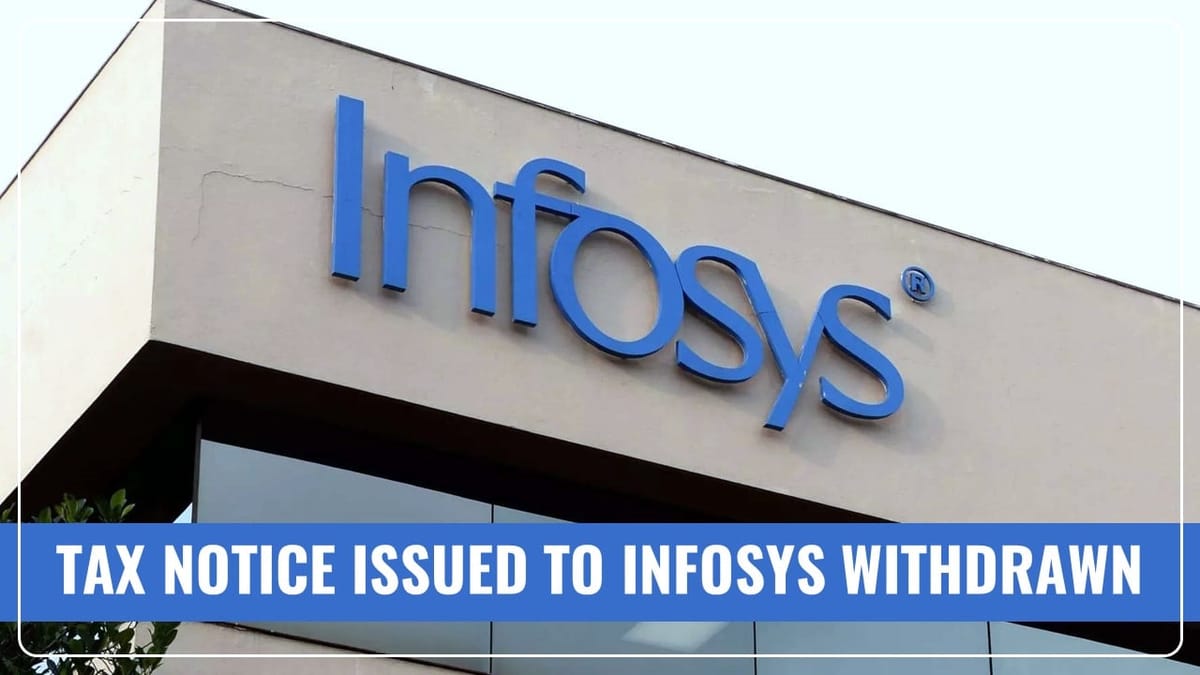Anisha Kumari | Aug 2, 2024 |

Karnataka Withdraws Tax Notice issued to Infosys; Central Government may Review Case
In a quick turn of events, Karnataka state authorities withdrew a tax notice they issued just a day earlier to Infosys, a leading IT company. On Wednesday, the GST investigation department demanded Rs.32,403 crore from Infosys. Along with this, Karnataka state authorities also sent another notice to the company. Late on Thursday, Infosys informed the stock exchanges that the Karnataka authorities had withdrawn their notice. They also directed Infosys to respond further to the central authority, the Directorate General of GST Intelligence (DGGI).
Sources indicate that the central government might review the GST notice sent to Infosys. There are concerns that other IT companies might face similar GST demands. The industry association Nasscom has asked the authorities to address investor concerns about unnecessary litigation and uncertainties in doing business. “Each case will be looked at individually, based on its details,” an official told.
The GST authorities will check if the case can be viewed under the 26th June circular. This circular provides clarity on the value of the “import of services” by a related person. It states that for importing services, the assumed open market value of transactions will be nil if a full input tax credit is available. However, whether Infosys qualifies under this rule needs to be examined, an insider said.
Additionally, such cases need to be checked to see if they result from common industry practices. If so, they could be addressed under the newly introduced Section 11A of the Central GST Act. This section allows tax authorities to waive dues arising from widespread industry practices. The tax demand on Infosys is a pre-GST notice, issued with the understanding that any assessment for FY 2017 would be time-barred on August 5.
Officials said they would review Infosys’ response to the Karnataka State GST authorities’ tax demand. Infosys had responded earlier and is now preparing a reply to the DGGI for the notice issued on Wednesday. “Some sectors where notices are being issued based on broad interpretations might be evaluated and could be regularized,” another source pointed out.
Section 11A is part of the amendments to the Central GST (CGST) Act, approved by the GST Council on June 22 and included in the Union Budget on July 23. This amendment will take effect once the Finance Bill passes in the Rajya Sabha. It allows for regularizing non-levy or short levy of GST, where the tax paid either fell short or was not paid due to common trade practices. This provision could help resolve past disputes more quickly.
Officials said the new provision gave legal backing to the authorities and would be used where appropriate. The DGGI issued the show cause notice on July 30, stating that Infosys created overseas branches to serve clients as part of its agreement with them. These branches and the company are treated as “distinct persons” under the Integrated GST Act. Infosys included its expenses on overseas branches as part of export invoices from India and, based on those export values, calculated the eligible refund.
The DGGI notice said, “In lieu of receiving supplies from overseas branch offices, the company has paid consideration to the branch offices in the form of overseas branch expenses. Hence, Infosys Ltd Bengaluru is liable to pay GST under the reverse charge mechanism on supplies received from branches located outside India.” Infosys responded that the notice covers the period from July 2017 to March 2022 and concerns expenses by its overseas branches. The company stated it had settled all dues and that GST was not applicable to the expenses claimed by the DGGI.
Nasscom said on Thursday that the notice showed a lack of understanding of the sector’s working. Nasscom pointed out that the government and the GST Council had been supportive and had issued a circular to address this issue. “The government circulars issued based on recommendations of the GST Council must be honoured in enforcement mechanisms so that notices do not create uncertainty and negatively impact perceptions on India’s ease of doing business. It is crucial that compliance obligations are not subject to multiple interpretations,” Nasscom stated.
Mohandas Pai, Former CFO of Infosys, expressed his concerns on social media, calling the notice “outrageous” and a case of “tax terrorism at its worst.” He emphasized that service exports from India are not subject to GST and questioned the officials’ interpretations.
The case highlights the complexities and challenges in tax enforcement and compliance for large companies like Infosys. It also underscores the need for clear and consistent rules to avoid uncertainties and promote a favourable business environment in India. The outcome of this review could set a precedent for how similar cases are handled in the future.
In case of any Doubt regarding Membership you can mail us at [email protected]
Join Studycafe's WhatsApp Group or Telegram Channel for Latest Updates on Government Job, Sarkari Naukri, Private Jobs, Income Tax, GST, Companies Act, Judgements and CA, CS, ICWA, and MUCH MORE!"